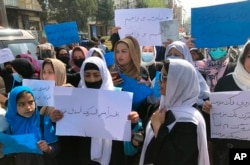A senior United Nations observer Thursday expressed serious concern about the "erasure of women from public life" across Afghanistan since the Islamist Taliban seized power in August.
"Afghanistan is facing a plethora of critical human rights challenges that are having a severe impact on the population," Richard Bennett, the U.N. special rapporteur on the situation of human rights in Afghanistan, told a news conference in Kabul at the end of his 11-day maiden trip to the country.
"I urge the authorities to acknowledge the human rights challenges that they are facing and to close the gap between their words and their deeds," he stressed.
The insurgent-turned-ruling group's male-only government has suspended Afghan girls' secondary education, prevented most female employees from returning to government jobs, barred women from traveling alone, ordered them to cover up fully in public, including their faces, and strongly advised them to stay at home.
Bennett said the policies "fit the pattern of absolute gender segregation and are aimed at making women invisible in society."
"The de facto authorities have failed to acknowledge the magnitude and gravity of the abuses being committed, many of them in their name and their responsibility to address them and protect the entire population," Bennett noted.
The U.N. expert met with Taliban leaders, members of Afghan civil society, including women human rights defenders, journalists, minorities and victims of human rights violations.
The U.N. expert spoke on a day when Taliban forces in Kabul reportedly disrupted a women's protest that called for the reopening of girls' schools.
"Civil society space and media freedom is critical for a peaceful society in which rights are respected," Bennett said.
Bennett said he was able to visit a prison, hospitals, schools and mosques in several places in the Afghan capital, and northern Mazar-i-Sharif, as well as southern Kandahar cities.
Bennett noted the Taliban had extended their invitation for him to access the entire country and to visit sensitive locations "in a crucial commitment to ensure that transparent monitoring can be undertaken."
The international community has not recognized the Taliban as the legitimate rulers of Afghanistan, saying the issue would come under consideration only after the Islamist group adheres to its pledges to protect the human rights of all Afghans, especially those of women.
The Taliban seized power from the Western-backed former government in August when the last U.S.-led international forces withdrew from the country after almost 20 years of war with the Islamist group.
"The Taliban stands at a crossroads. Either the society will become more stable and a place where every Afghan enjoys freedom and human rights, or it will become increasingly restrictive," Bennett cautioned. He will present the findings of his first report to the September session of the U.N. Human Rights Council.






